2010年中考英语现在完成时复习课件
图片预览

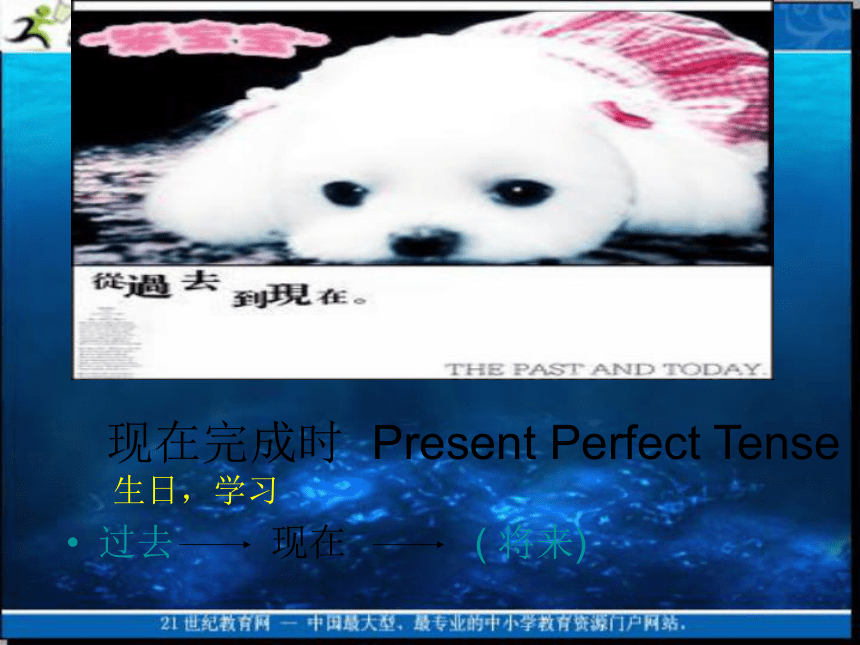
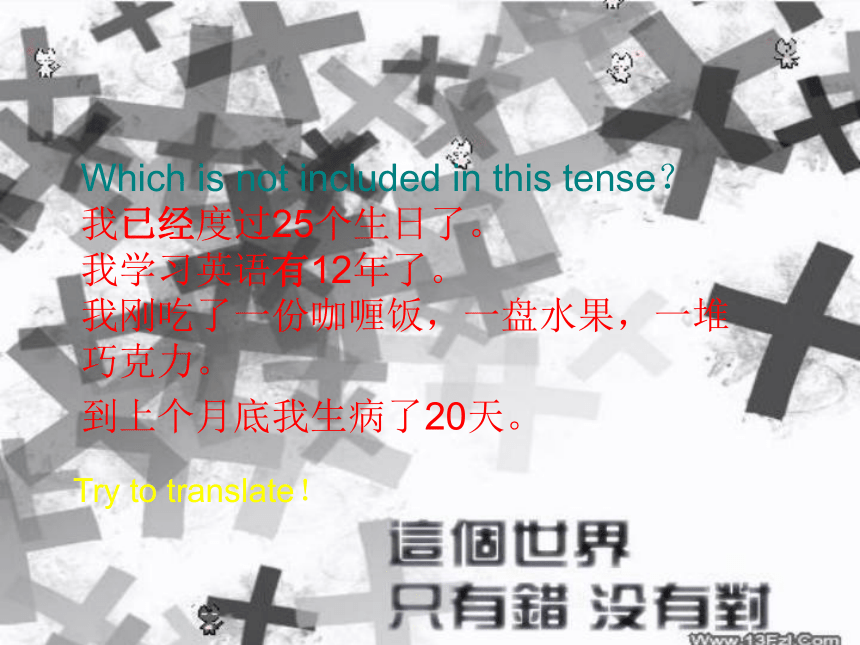


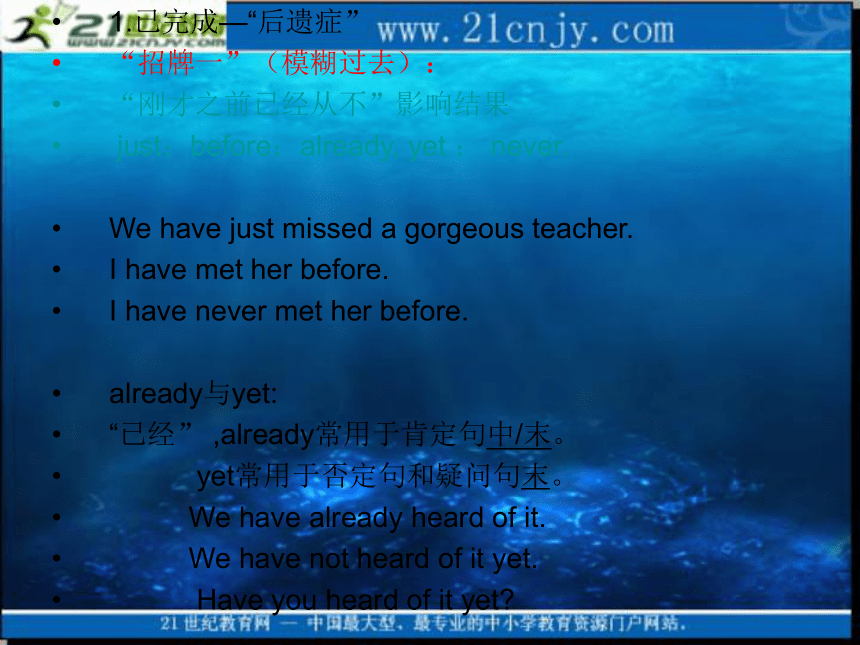
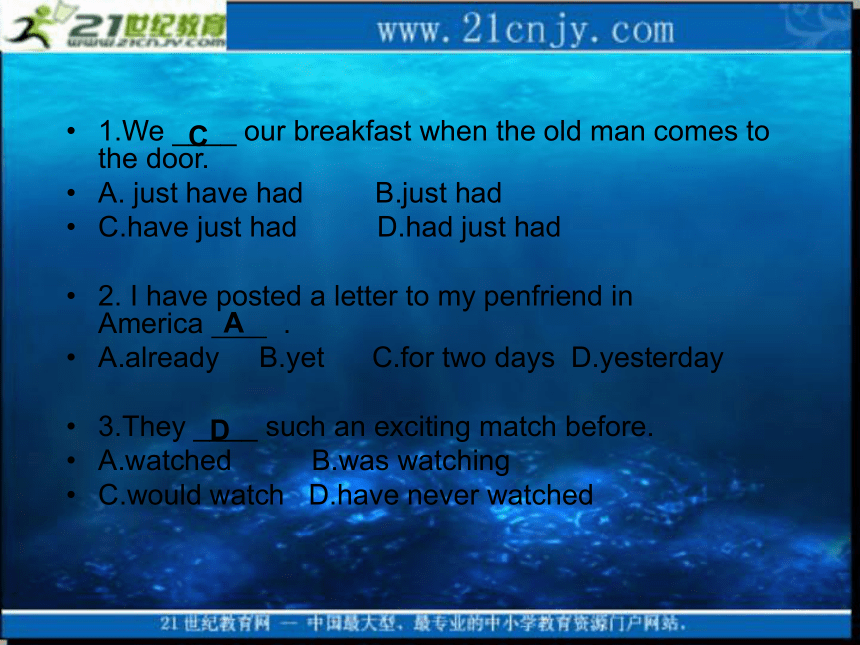

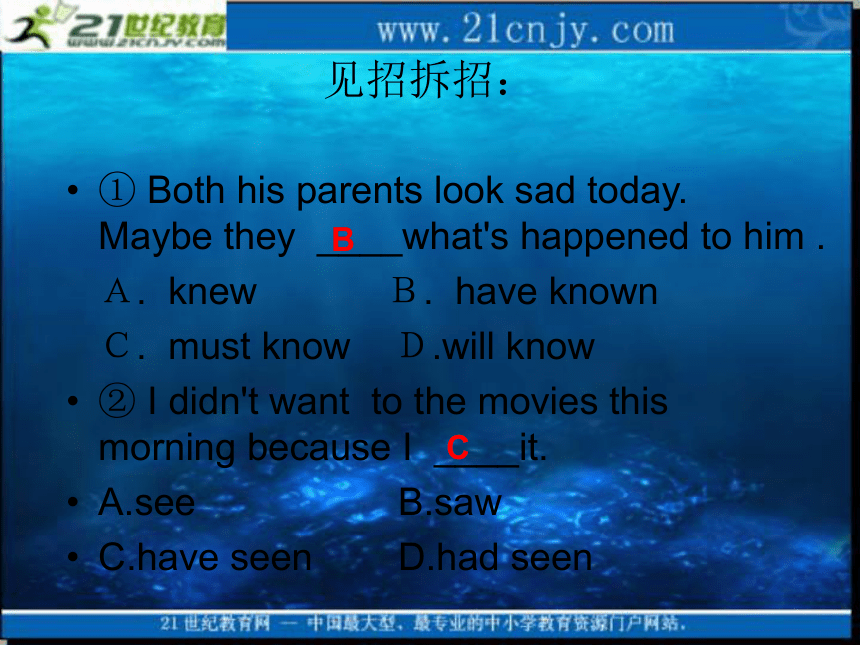
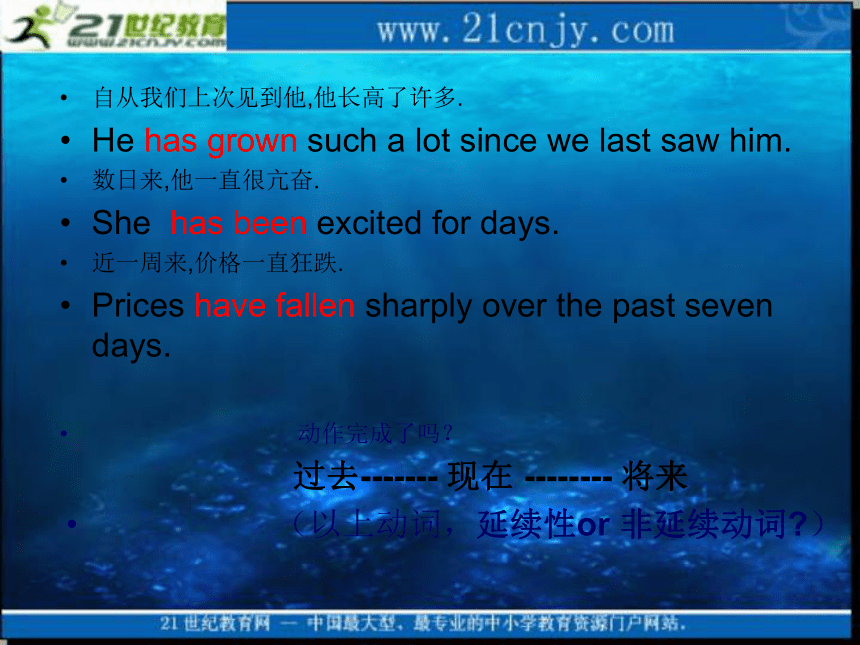
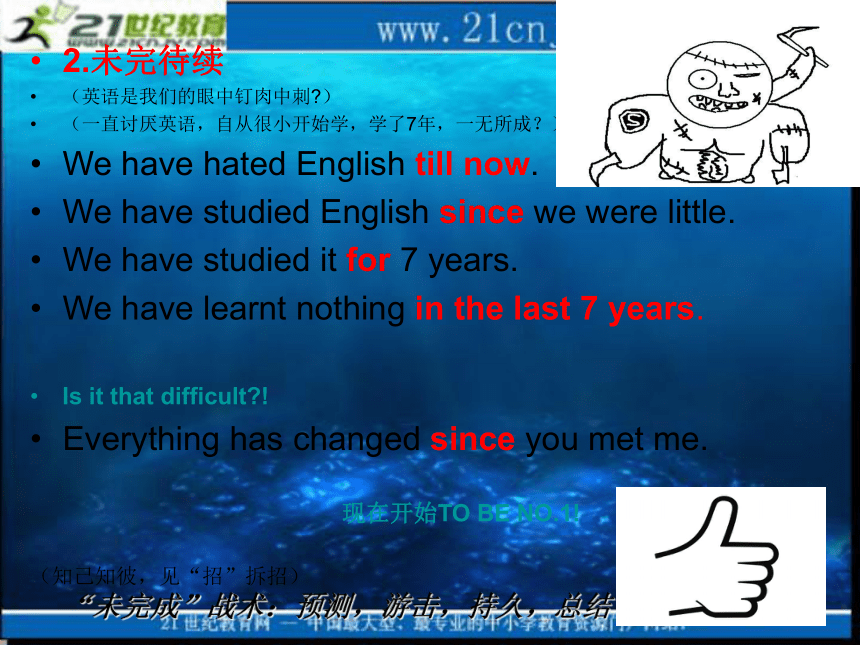

文档简介
课件36张PPT。Which is not true?
我已经度过25个生日了。
我学习英语有13年了。
到上个月底我生病了20天。
我刚吃了一份咖喱饭,
一盘水果,一堆巧克力。
现在完成时 Present Perfect Tense 生日,学习
过去 现在 ( 将来)
Which is not included in this tense?
我已经度过25个生日了。
我学习英语有12年了。
我刚吃了一份咖喱饭,一盘水果,一堆巧克力。
到上个月底我生病了20天。
Try to translate!
二、现在完成时态的基本句式 : 构成:“have/has+动词的过去分词 ”
肯定句:I have finished my homework.
否定句:I have not finished my homework.
一般疑问句:Have you finished your homework ?
-Yes,I have /No,I haven”t.
特殊疑问句:How long have you studied English?
反意疑问句:You have studied for several years,
haven’t you?
He’s never been to Hainan Island before,
has he?
He’s flown to Qingdao for summer holidays, _____ he?
A.isn’t B. wasn’t C.hasn’t D.doesn’t
三、现在完成时态的用法 I have already had supper.
(=I had supper and now I am
not hungry.)
I have lost my heart in singsing songs.
(=I lost my heart and I am not confident now.)
动作完成了吗?
过去----现在
1.已完成—“后遗症”
“招牌一”(模糊过去):
“刚才之前已经从不”影响结果
just;before;already, yet ; never.
We have just missed a gorgeous teacher.
I have met her before.
I have never met her before.
already与yet:
“已经” ,already常用于肯定句中/末。
yet常用于否定句和疑问句末。
We have already heard of it.
We have not heard of it yet.
Have you heard of it yet?
1.We ____ our breakfast when the old man comes to the door.
A. just have had B.just had
C.have just had D.had just had
2. I have posted a letter to my penfriend in America .
A.already B.yet C.for two days D.yesterday
3.They ____ such an exciting match before.
A.watched B.was watching
C.would watch D.have never watched
CDA 招牌二.(把握当前):
now, today, this morning, this week
他今天做了很多工作吗?
Has he done much work today?
你们这星期开心吗?
Have you been happy this week?
见招拆招:
① Both his parents look sad today. Maybe they ____what's happened to him .
A. knew B. have known
C. must know D.will know
② I didn't want to the movies this morning because I ____it.
A.see B.saw
C.have seen D.had seenBC自从我们上次见到他,他长高了许多.
He has grown such a lot since we last saw him.
数日来,他一直很亢奋.
She has been excited for days.
近一周来,价格一直狂跌.
Prices have fallen sharply over the past seven days.
动作完成了吗?
过去------- 现在 -------- 将来
(以上动词,延续性or 非延续动词?) 2.未完待续
(英语是我们的眼中钉肉中刺?)
(一直讨厌英语,自从很小开始学,学了7年,一无所成?)
We have hated English till now.
We have studied English since we were little.
We have studied it for 7 years.
We have learnt nothing in the last 7 years.
Is it that difficult?!
Everything has changed since you met me.
现在开始TO BE NO.1!
(知己知彼,见“招”拆招) “未完成”战术:预测,游击,持久,总结
招牌三. (预测战况) “到目前为止”.
so far, (up) till/ until now, up to the moment
1.I ________ excited until now.
2.到目前为止一切正常。
everything has been OK so far.
= So far so good.
3.目前我们已爱上英语.
We have fallen in love with English up to the moment.招牌四.游击战 (重要!!!)
since + 过去时间点/过去从句,动作、状态从何时开始。
自从去年,他养成了另一个坏习惯.
Since last year, he has developed into another bad habit.
自从我到新东方来一直很忙.
I have been busy since I came to New Oriental.
招牌五. 持久战 (重要!!!)
for +时间段,表示动作或状态持续了多久。
抗日战争打了8年.
The Anti-Japanese War has lasted for 8 years.
这句对吗?
这里有将近1个月没有下雨了.
There has been no rain here for nearly one months.
我们这节课上了一个多小时.
We have had this class for about an hour.
1.My grandfather _____ in this city since he was born.
A.had lived B.lived
C.has lived D.lives
2.My father ____ on business for two weeks. He’ll return in 2 days.
A.left B.has left
C.has gone D.has been away
3.-How is your father? I ____ him for a long time.
- he is fine,but busy.
A.don’t see B.hadn’t seen
C.didn’t see D .haven’t seen
ADD招牌六.(总结战术)
在刚刚过去的5年里
in/during the past/last five years
上2周他都没有在学校.
He has been away from school during/in the last two weeks.
活学活用
总结: 不管何种战术,同一共同点--过去发生,持续到现在,还可能持续下去。
见招拆招:
①.How long __ you ___ here since you ____ to China?
A.did,live;came B.do,live ;come C.have,lived;came D.will,live;have come
②—Our country ___ a lot so far .
—Yes . I hope it will be even ______ .
A. has changed ; well B. changed ; good
C. has changed ; better D. changed ; better
③.The old man _______ here for 20 years.
A.live B.lives C.lived D.has lived
④.There was a knock at the door. It was the second time someone ______me that evening.
A.interrupted B. have interrupted
C.had interrupted D.interruptes
CCDC
.完成时态可用在下列结构中:
①.This (That, It) is (was) the first (second…) time +完成时
“第…次做…”
这是我外婆第一次用手机.
It is the first time my grandmother has used a cellphone.
这是我第二次从一个电影中学到这么多.
That is the second time I have learnt so much from a movie. ?
《士兵突击》
被褥要求:整整齐齐,平四方,侧八角,苍蝇飞上去劈叉!蚊子飞上去打滑!!
你现在混日子,小心将来日子混了你。
不抛弃,不放弃!
完成时态可用在下列结构中:
②. This (It…) is (was) +形容词最高级+ n +完成时态
“到现在为止是最…的”
你是我见过最棒的老师!
You are the best teacher that I have ever met.
那是我见过的最大的猪.
That was the biggest pig that I had seen.
那是我听过最美妙的音乐.
It was the sweetest music (that) I had heard.
注意以上的时态:
主句一般现在时,从句现在完成时;
主句一般过去时,从句过去完成时。
(活学活用)
1.This is one of the rarest questions that _____ in class.
A. raised B. was raised
C.has been raised D. had been raised
2. It ___ the most delicious food I ___ .
A.is ,had tasted B.is ,taste
C.was, have tasted D. was ,had tasted 你曾经去过颐和园吗?
Have you ever been to the Summar Palace?
我从来没有见过这么美的风景.
I have never seen so picturesque scenery in my life.
3.经历尝试:
经验性用法:过去曾发生过一次或多次的情况,也可以说是一种经历。
招牌七:before, ever, once, twice, many times见招拆招:
①.Harry Potter is a very nice film .I____ it twice .
A. will see B. have seen C. saw D.see
②.--Where have you ___ these days?
--I have _____ to Beijing with my friends.
A. been , gone B. been , been
C. gone , been D. gone, gone
注意:.have been to/ have gone to
have been to 表示“去过人已回”
have gone to 表示“已去人不在”总结:
现在完成时的用法:
1.已完成
时间状语:
2.未完成
时间状语:
3.经历尝试
时间状语:
解释句子:
1.He left London 2 years ago.(中考题)
He has been away from London for 2years.
It’s been 2 weeks since he left London.
2. My father joined the party 20 years ago.
My father has been a party member for 20 years.
四、非延续性动词与现在完成时
1.现在完成时未完成用法只能用延续性动词。
如果是非延续性动词,且句中有表示一段时间的状语(for,since),需将非延续性动词变成延续性动词。
My grandma has died.(a month)
My grandma has been dead for a month.2.非延续性动词转成延续性动词,有以下几种:
① 用相应的延续性动词,如
borrow-keep, put on- wear, buy-have
I bought a new computer a year ago.
I have had a new computer for a year.
He borrowed this book from her last week.
He has kept this book since last week.
② 转换成“be+名词/介词”。如
join the party- be a party member
join the army-be a soldier / be in the army
go to school- be a student / be at school
He joined the army 5 years ago.
He has been a a soldier since 5 years ago.
He has been in the army for 5 years.
She went to school when she was four.
She has been a student since she was four.
③.转换成“be+形容词或副词”。如
open-be open close-be closed
begin-be on finish- be over
leave- be away move- be out of
put on -be on die- be dead
fall asleep- be asleep
The movie began 30 minutes ago.
The movie has been on for 30 minutes .
The girl left school last week.
The girl has been away from school since last week.
见招拆招: 1.从两年前起他就在这儿。 He ____ ____her since two years _____.
2.Jack has a watch. He _____ it for two years. A.has had B.has bought C.got D.bought
3.I was late for the show.when I got there ,it _____ for 10 minutes.
A.finished B.has finished C.had been over
测试:说出对应的延续性动词
borrow-, put on-, buy-
join the party-
join the army-
go to school-
open- close-
begin- finish-
leave- move-
put on - die-
fall asleep-
以下句子正确吗?
We haven’t borrowed books from school library for half a month.
I haven’t bought something expensive since last month.
非延续性动词的否定式,已经成为一种可以延续的状态,因此可以和表示一段时间的状语连用。
他已经很久没有去学校了.
He hasn’t gone to school for a long time.
(手表丢了)
I lost my watch two days ago.
(不涉及现在是否还没有找到)
I have lost my watch I can’t find it now.
(强调现在还没有找到) (等人)
She waited him for an hour.
(不涉及现在是否还在等)
She has waited him for an hour.
(强调现在还在等) 现在完成时VS 一般过去时谁是谁非?
1.I have finished reading this book three days ago.
I finished reading this book three days ago.
2.The plane _____ off ten minutes ago .
A.has taken B.took C.would take 1.(06深圳中考)
-Where is Sally?
-She ____ to Hong Kong. She ________ yesterday.
A. went ,has left B.has gone,left
C.has been, has left D.has left,went
2.Excuse me, _____ you seen the film yet? --Yes, I ___ it last night.
A. have, see B. have, have seen C. have, seen D. have, saw
3.He _____ the dictionary for 5 years. He _____ it in 1997.
A. has bought ;bought B.bought; bought
C.has kept; has bought D.has had;bought
BDD
我已经度过25个生日了。
我学习英语有13年了。
到上个月底我生病了20天。
我刚吃了一份咖喱饭,
一盘水果,一堆巧克力。
现在完成时 Present Perfect Tense 生日,学习
过去 现在 ( 将来)
Which is not included in this tense?
我已经度过25个生日了。
我学习英语有12年了。
我刚吃了一份咖喱饭,一盘水果,一堆巧克力。
到上个月底我生病了20天。
Try to translate!
二、现在完成时态的基本句式 : 构成:“have/has+动词的过去分词 ”
肯定句:I have finished my homework.
否定句:I have not finished my homework.
一般疑问句:Have you finished your homework ?
-Yes,I have /No,I haven”t.
特殊疑问句:How long have you studied English?
反意疑问句:You have studied for several years,
haven’t you?
He’s never been to Hainan Island before,
has he?
He’s flown to Qingdao for summer holidays, _____ he?
A.isn’t B. wasn’t C.hasn’t D.doesn’t
三、现在完成时态的用法 I have already had supper.
(=I had supper and now I am
not hungry.)
I have lost my heart in singsing songs.
(=I lost my heart and I am not confident now.)
动作完成了吗?
过去----现在
1.已完成—“后遗症”
“招牌一”(模糊过去):
“刚才之前已经从不”影响结果
just;before;already, yet ; never.
We have just missed a gorgeous teacher.
I have met her before.
I have never met her before.
already与yet:
“已经” ,already常用于肯定句中/末。
yet常用于否定句和疑问句末。
We have already heard of it.
We have not heard of it yet.
Have you heard of it yet?
1.We ____ our breakfast when the old man comes to the door.
A. just have had B.just had
C.have just had D.had just had
2. I have posted a letter to my penfriend in America .
A.already B.yet C.for two days D.yesterday
3.They ____ such an exciting match before.
A.watched B.was watching
C.would watch D.have never watched
CDA 招牌二.(把握当前):
now, today, this morning, this week
他今天做了很多工作吗?
Has he done much work today?
你们这星期开心吗?
Have you been happy this week?
见招拆招:
① Both his parents look sad today. Maybe they ____what's happened to him .
A. knew B. have known
C. must know D.will know
② I didn't want to the movies this morning because I ____it.
A.see B.saw
C.have seen D.had seenBC自从我们上次见到他,他长高了许多.
He has grown such a lot since we last saw him.
数日来,他一直很亢奋.
She has been excited for days.
近一周来,价格一直狂跌.
Prices have fallen sharply over the past seven days.
动作完成了吗?
过去------- 现在 -------- 将来
(以上动词,延续性or 非延续动词?) 2.未完待续
(英语是我们的眼中钉肉中刺?)
(一直讨厌英语,自从很小开始学,学了7年,一无所成?)
We have hated English till now.
We have studied English since we were little.
We have studied it for 7 years.
We have learnt nothing in the last 7 years.
Is it that difficult?!
Everything has changed since you met me.
现在开始TO BE NO.1!
(知己知彼,见“招”拆招) “未完成”战术:预测,游击,持久,总结
招牌三. (预测战况) “到目前为止”.
so far, (up) till/ until now, up to the moment
1.I ________ excited until now.
2.到目前为止一切正常。
everything has been OK so far.
= So far so good.
3.目前我们已爱上英语.
We have fallen in love with English up to the moment.招牌四.游击战 (重要!!!)
since + 过去时间点/过去从句,动作、状态从何时开始。
自从去年,他养成了另一个坏习惯.
Since last year, he has developed into another bad habit.
自从我到新东方来一直很忙.
I have been busy since I came to New Oriental.
招牌五. 持久战 (重要!!!)
for +时间段,表示动作或状态持续了多久。
抗日战争打了8年.
The Anti-Japanese War has lasted for 8 years.
这句对吗?
这里有将近1个月没有下雨了.
There has been no rain here for nearly one months.
我们这节课上了一个多小时.
We have had this class for about an hour.
1.My grandfather _____ in this city since he was born.
A.had lived B.lived
C.has lived D.lives
2.My father ____ on business for two weeks. He’ll return in 2 days.
A.left B.has left
C.has gone D.has been away
3.-How is your father? I ____ him for a long time.
- he is fine,but busy.
A.don’t see B.hadn’t seen
C.didn’t see D .haven’t seen
ADD招牌六.(总结战术)
在刚刚过去的5年里
in/during the past/last five years
上2周他都没有在学校.
He has been away from school during/in the last two weeks.
活学活用
总结: 不管何种战术,同一共同点--过去发生,持续到现在,还可能持续下去。
见招拆招:
①.How long __ you ___ here since you ____ to China?
A.did,live;came B.do,live ;come C.have,lived;came D.will,live;have come
②—Our country ___ a lot so far .
—Yes . I hope it will be even ______ .
A. has changed ; well B. changed ; good
C. has changed ; better D. changed ; better
③.The old man _______ here for 20 years.
A.live B.lives C.lived D.has lived
④.There was a knock at the door. It was the second time someone ______me that evening.
A.interrupted B. have interrupted
C.had interrupted D.interruptes
CCDC
.完成时态可用在下列结构中:
①.This (That, It) is (was) the first (second…) time +完成时
“第…次做…”
这是我外婆第一次用手机.
It is the first time my grandmother has used a cellphone.
这是我第二次从一个电影中学到这么多.
That is the second time I have learnt so much from a movie. ?
《士兵突击》
被褥要求:整整齐齐,平四方,侧八角,苍蝇飞上去劈叉!蚊子飞上去打滑!!
你现在混日子,小心将来日子混了你。
不抛弃,不放弃!
完成时态可用在下列结构中:
②. This (It…) is (was) +形容词最高级+ n +完成时态
“到现在为止是最…的”
你是我见过最棒的老师!
You are the best teacher that I have ever met.
那是我见过的最大的猪.
That was the biggest pig that I had seen.
那是我听过最美妙的音乐.
It was the sweetest music (that) I had heard.
注意以上的时态:
主句一般现在时,从句现在完成时;
主句一般过去时,从句过去完成时。
(活学活用)
1.This is one of the rarest questions that _____ in class.
A. raised B. was raised
C.has been raised D. had been raised
2. It ___ the most delicious food I ___ .
A.is ,had tasted B.is ,taste
C.was, have tasted D. was ,had tasted 你曾经去过颐和园吗?
Have you ever been to the Summar Palace?
我从来没有见过这么美的风景.
I have never seen so picturesque scenery in my life.
3.经历尝试:
经验性用法:过去曾发生过一次或多次的情况,也可以说是一种经历。
招牌七:before, ever, once, twice, many times见招拆招:
①.Harry Potter is a very nice film .I____ it twice .
A. will see B. have seen C. saw D.see
②.--Where have you ___ these days?
--I have _____ to Beijing with my friends.
A. been , gone B. been , been
C. gone , been D. gone, gone
注意:.have been to/ have gone to
have been to 表示“去过人已回”
have gone to 表示“已去人不在”总结:
现在完成时的用法:
1.已完成
时间状语:
2.未完成
时间状语:
3.经历尝试
时间状语:
解释句子:
1.He left London 2 years ago.(中考题)
He has been away from London for 2years.
It’s been 2 weeks since he left London.
2. My father joined the party 20 years ago.
My father has been a party member for 20 years.
四、非延续性动词与现在完成时
1.现在完成时未完成用法只能用延续性动词。
如果是非延续性动词,且句中有表示一段时间的状语(for,since),需将非延续性动词变成延续性动词。
My grandma has died.(a month)
My grandma has been dead for a month.2.非延续性动词转成延续性动词,有以下几种:
① 用相应的延续性动词,如
borrow-keep, put on- wear, buy-have
I bought a new computer a year ago.
I have had a new computer for a year.
He borrowed this book from her last week.
He has kept this book since last week.
② 转换成“be+名词/介词”。如
join the party- be a party member
join the army-be a soldier / be in the army
go to school- be a student / be at school
He joined the army 5 years ago.
He has been a a soldier since 5 years ago.
He has been in the army for 5 years.
She went to school when she was four.
She has been a student since she was four.
③.转换成“be+形容词或副词”。如
open-be open close-be closed
begin-be on finish- be over
leave- be away move- be out of
put on -be on die- be dead
fall asleep- be asleep
The movie began 30 minutes ago.
The movie has been on for 30 minutes .
The girl left school last week.
The girl has been away from school since last week.
见招拆招: 1.从两年前起他就在这儿。 He ____ ____her since two years _____.
2.Jack has a watch. He _____ it for two years. A.has had B.has bought C.got D.bought
3.I was late for the show.when I got there ,it _____ for 10 minutes.
A.finished B.has finished C.had been over
测试:说出对应的延续性动词
borrow-, put on-, buy-
join the party-
join the army-
go to school-
open- close-
begin- finish-
leave- move-
put on - die-
fall asleep-
以下句子正确吗?
We haven’t borrowed books from school library for half a month.
I haven’t bought something expensive since last month.
非延续性动词的否定式,已经成为一种可以延续的状态,因此可以和表示一段时间的状语连用。
他已经很久没有去学校了.
He hasn’t gone to school for a long time.
(手表丢了)
I lost my watch two days ago.
(不涉及现在是否还没有找到)
I have lost my watch I can’t find it now.
(强调现在还没有找到) (等人)
She waited him for an hour.
(不涉及现在是否还在等)
She has waited him for an hour.
(强调现在还在等) 现在完成时VS 一般过去时谁是谁非?
1.I have finished reading this book three days ago.
I finished reading this book three days ago.
2.The plane _____ off ten minutes ago .
A.has taken B.took C.would take 1.(06深圳中考)
-Where is Sally?
-She ____ to Hong Kong. She ________ yesterday.
A. went ,has left B.has gone,left
C.has been, has left D.has left,went
2.Excuse me, _____ you seen the film yet? --Yes, I ___ it last night.
A. have, see B. have, have seen C. have, seen D. have, saw
3.He _____ the dictionary for 5 years. He _____ it in 1997.
A. has bought ;bought B.bought; bought
C.has kept; has bought D.has had;bought
BDD
同课章节目录
